Celebrating the New Edition of Met Her on the Mountain
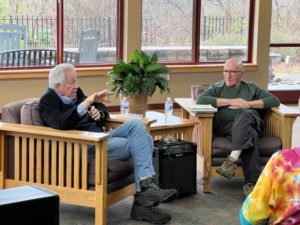
Mark Pinsky with interviewer Rob Amberg at an event at the Madison County Library. Photo by Sarah M. Brown.
After meeting so many people in Madison County who have become good friends over the years, whenever I go back there, a part of me feels like I am coming home.
That was true recently when I returned for a week to promote the new, paperback edition of Met Her on the Mountain: The Murder of Nancy Morgan. Events included in-person readings, discussions, and signings as well as a Zoom event at Malaprop’s Bookstore & Cafe in Asheville.
What I did not expect was an apparently new development in the investigation into the murder of Nancy Morgan.
A Spirited Exchange with Pat Franklin at Madison County Public Library
On the evening of April 5th, about 35 people gathered at the Madison County Library in Marshall, a stone and glass gem that looks out on the mountains (a big thank you to Director Kim Bellafatto). The format was a brief reading by me and then a discussion led by the great photographer (and my longtime friend) Rob Amberg. Rob has chronicled life in Madison County for more than 40 years, and he was one of the first people I met when I first began researching Met Her on the Mountain.
Rob began with some typically acute and perceptive insights into the culture of the Southern Appalachians generally and Madison County in particular. He talked a good deal about what I call in my book “the altruistic impulse” that has brought outsiders into the area for the past two centuries. The reformers came to promote what is sometimes referred to by sociologists and economists as “uplift.” Most of these missionaries, secular as well as religious, have often failed in their well-intentioned efforts, as was the case for the members of the federally-funded Volunteers in Service to America (VISTA) that included Nancy Morgan.
As the session unfolded, there were several surprises.
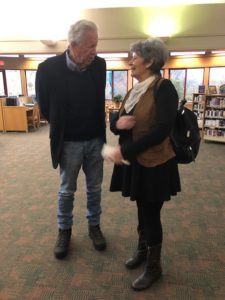
With Pat Franklin. Photo by Rob Amberg.
Pat Franklin, another longtime acquaintance (who I consider a friend, although she may disagree) showed up at the library. I had invited her, not knowing if she would come. Pat is a native of Madison County and was a political protégé of the late Sheriff E. Y. Ponder, who is a central character in Met Her on the Mountain. Pat is fiercely loyal, which I respect. Before submitting my original manuscript to the publisher, I sent the draft to her for review. She didn’t like it. And typically, Pat made no secret of her dislike, which is one of the reasons I sent it to her. I like to be challenged by anyone who knows what they’re talking about.
Pat felt that I unfairly portrayed Madison County during the period of 1948 to 1970 as, in my words, an “isolated, impoverished, and corrupt” corner of the mountains. But even more, she objected to my portrayal of Sheriff Ponder. She said he had done many unquestionably good things, which I had not included. I thanked her for her frankness and asked for some examples of this laudable conduct. She shared her thoughts, and, after checking them out, I added them to the text of the book. These included the sheriff’s progressive views on race as well as some quiet good deeds, like working with storekeeper George Penland to provide shoes for the county’s poor children.
I was grateful that Pat showed up at the library to challenge me again, this time in public, and to put me through my paces. Some members of the audience seemed upset at our spirited exchange, but I was pleased. After the session, we chatted amiably, and I thanked her again.
The Use of Genetic Genealogy in the Nancy Morgan Murder Case
But the most significant event of the evening came toward the end. During my presentation, I read a section from the new edition of the book, in which I outlined my heretofore unsuccessful effort to get the North Carolina State Bureau of Investigation to utilize a new forensic technique of analyzing DNA found on and in murder victims, known as genetic genealogy. For comparisons, it searches for collateral relatives of suspects, drawing on commercial databases like Ancestry.com and 23andMe. Since being used to solve the Golden State Killing in California several years ago, genetic genealogy has been credited with solving numerous cold case murders across North America. An SBI spokesperson told me in an email that the bureau was not interested in my suggestion.
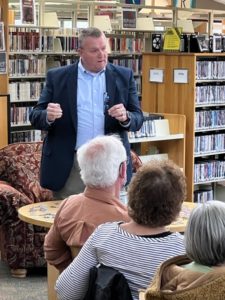
Madison County Sheriff Buddy Harwood. Photo by Sarah M. Brown.
I also told the audience that, despite numerous attempts, I had no more success in reaching out to Madison County Sheriff Buddy Harwood. Shortly after making that point – as if by magic, although by coincidence, since he was attending another meeting in the library – the sheriff himself joined the meeting. He made a spirited defense of his handling of the Morgan investigation. Harwood, who is up for reelection this year, told the group that the investigation was active and ongoing, and he seemed to say that he and former Sheriff John Ledford had even made a trip to Washington, D.C., to consult with the FBI. He said that the sheriff’s department, with the SBI, were in fact making use of genetic genealogy on the Morgan case.
Then, as fate would have it, on April 10th, the Winston-Salem Journal featured a front page story about another cold case murder had been solved using this technique. Amid a press conference and great fanfare three days before, members of the Surry County Sheriff’s office were joined by North Carolina Attorney General Josh Stein and SBI Director Robert Schurmeier. They announced that a suspect was arrested and was being held in custody in connection with a 1992 murder.
“I want to send a clear message here. Hear my words,” Schurmeier said at the news conference. “The men and women of the SBI in partnerships with sheriff’s offices across this state and around the country will seek out justice for the cold cases that we have on our books. We will work day and night to pursue the suspects who think they may have gotten away with it 20, 30, 40 years ago.”
If the scope of these cold case investigations stretches back 50 years, they should include the 1970 murder of Nancy Morgan.
Other Events in Madison County
There were other events throughout our week in the mountains. Historian Patricia Furnish interviewed me for a Zoom appearance at Malaprop’s Bookstore & Cafe in Asheville, which is available to watch on YouTube.
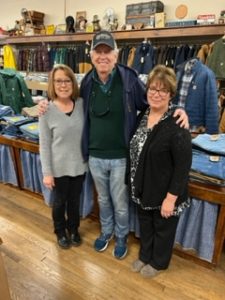
With Susan and Georgette Penland. Photo by Sarah M. Brown.
Georgette and Susan Penland hosted a signing at their family’s general store in Marshall on Thursday. The sisters’ late parents, George and Barbara, were generous and essential in helping with my early research into the Morgan case. Georgette also attended both library events in Marshall and Hot Springs (and gave me a Marshall t-shirt!).
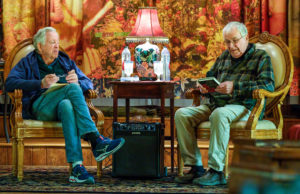
With co-host and friend Elmer Hall at the Hot Springs branch of the Madison County Library. Photo by Peggy Baker.
We had more than 30 people in Hot Springs at Sue Gurney’s event center in the converted Methodist Church, sponsored by the Hot Springs branch of the Madison County Library. My co-host at that gathering was Elmer Hall, the beloved proprietor of Sunnybank Inn and Retreat Center. Met Her on the Mountain is dedicated to Elmer, who I have known for more than 50 years, since our days at Duke. Among those in the audience was another old friend, Camille Shafer.
The next morning, we had signings at Bluff Mountain Outfitters in Hot Springs, thanks to owner Wayne Crosby, who I have known for decades. The store, which is a gem and indispensable for hikers, was crowded with northbound Appalachian Trail hikers. Later, my old friend Richard Dillingham, Madison County’s folklorist laureate, joined us for a signing at the Mars Hill University Book Store.
We hope to return in late May for another round of events coinciding with the release of my new nonfiction crime book, Drifting into Darkness: Murder, Madness, Suicide and a “Death Under Suspicious Circumstances.
Follow me on Facebook, Twitter, and Instagram to learn more. The quickest way to reach me is by email: osopinsky@gmail.com.